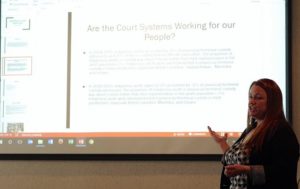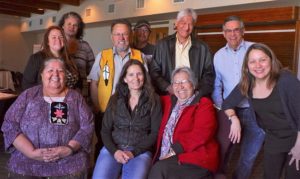Anishinaabemowin focus of Anishinabek legal traditions sessions

By Rick Garrick
THUNDER BAY—A focus on more education for children about Anishinabek laws was one of the recommendations at the Revitalization of Anishinabek Nation Legal Traditions session on May 10 at the Valhalla Inn in Thunder Bay.
“It’s got to start with the young children,” says Red Rock Indian Band Elder Terry Bouchard at the end of the session. “Now that the Anishinabek took over their jurisdiction in education, they can make sure that we [include Anishinabek legal traditions] in the curriculum right across the school and start teaching them the true history of this country.”
The session included two drum songs, a prayer, stories about being out on the land, and a presentation, Are the Court Systems Working for Our People? by Crystal Stevens-Head, lawyer and co-facilitator of the session.
“What we need to do is move forward, so we need to take what we know, our legal traditions, our Aboriginal teachings, our culture, our language, and we need to incorporate it into how we live today,” Stevens-Head says. “We have to build something that is for us because what they imposed on us and say we have to follow isn’t working.”
Stevens-Head says laws or legal systems need to be designed for each community.
“There can’t just be one, because each First Nation has their own history, their own stories, their own connection with the land,” Stevens-Head says. “It has to be built for that First Nation.”
Stevens-Head also shared information about the wampum belt treaties during her presentation.
“The example of the One Bowl One Spoon [Wampum Belt] was a treaty between the Anishinabek and the Haudeshaune over a hunting territory,” Stevens-Head says.
The Revitalization of Anishinabek Nation Legal Traditions session was the last of a series of meetings held in all four regions across Anishinabek Nation territory. They were funded through the Law Foundation of Ontario.

“We’ve invited two knowledge keepers from each of our member First Nations to come and we are sharing knowledge about stories, teachings and [other information] about our Anishinabek laws,” says Leanna Farr, legal counsel with the Anishinabek Nation and co-facilitator of the session. “We are all well aware that we had our own legal systems and governance systems before colonialism and those have been suppressed for 500 years or so. We are making a comeback; we’re getting back to those ways so this is really about revitalization and empowerment of those traditions and those laws.”
Farr says there was a focus on Anishinaabemowin in all of the sessions because of the important teachings and laws that are held within the language.
“[There] are really important teachings and laws in that language,” Farr says. “So revitalization of Anishinaabemowin is important, getting back to ceremonies and all of those cultural ways, connecting to the land. That’s what I’m hearing loud and clear is to revitalize our legal traditions, those are the key things we need to do — focus on the language, the ceremonies and getting out on to the land.”
Farr says all of the information that was gathered from the sessions will be compiled into a report, which will be shared with all of the session participants, the Anishinabek Nation chiefs and within the departments of the Anishinabek Nation.
“The report could be used as a resource,” Farr says. “If our staff are working on programming or a First Nation wants to work on developing its own law, Matrimonial Real Property for example, they can use this report as a resource to pull what they need from it.”


